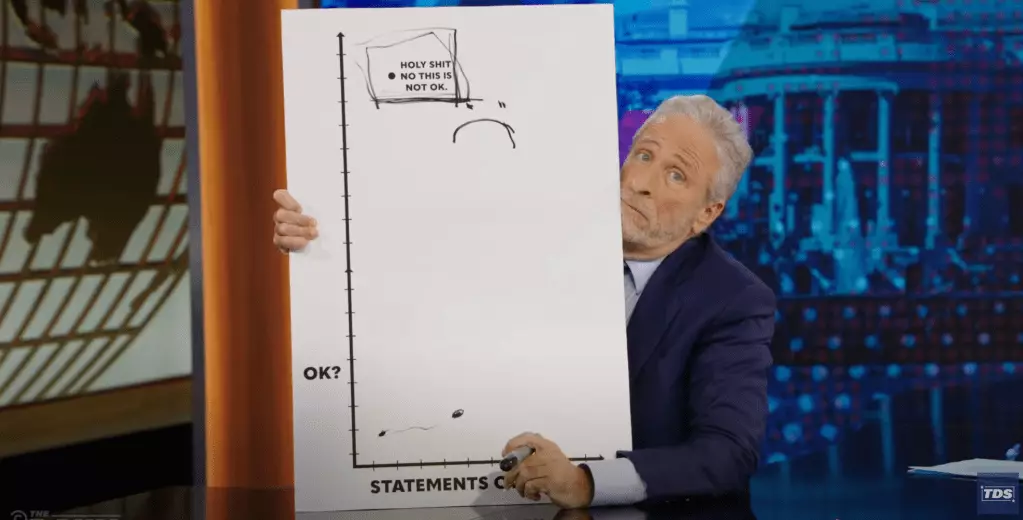Jon Stewart, the celebrated political satirist, has long been a beacon of reason amidst the chaos of political discourse. In a recent episode of *The Daily Show*, he introduced a chart designed to help viewers navigate the overwhelming onslaught of comments from former President Donald Trump. This innovative approach aims to filter which of Trump’s outlandish remarks warrant outrage and which should simply be seen as white noise. Stewart’s method, however, highlights an important paradox inherent in political commentary: the challenge of maintaining emotional detachment while addressing absurdity.
The core of Stewart’s argument is not simply about charting Trump’s statements; it’s about the emotional resilience one must cultivate in today’s political landscape, where the media often amplifies every outlier comment as breaking news. Stewart cleverly references ABC’s *Shark Tank*, establishing a playful connection while introducing the serious task of categorizing political noise. Nevertheless, his attempt at detachment soon fades as he grapples with his own emotional reactions to Trump’s antics, showcasing the difficulty of maintaining a composed stance in the face of absurdity.
The Challenge of Detachment
In an attempt to navigate complex political absurdities, Stewart’s chart serves as a visual metaphor for the emotional rollercoaster that comes with modern political commentary. The dual axes depict an emotional spectrum where rational discourse intersects with the often-frustrating reality of political theater. Stewart’s commentary—anchored in a world where Trump’s statements can range from bizarre to outright ludicrous—illustrates the struggle of critics to remain level-headed when faced with a rapid-fire sequence of nonsensical proclamations.
His frustrations are palpable as he reacts to Trump’s declarations, such as the desire to reopen Alcatraz as a prison, and even more absurd notions like him being the pope. He acknowledges the emotional toll that Trump’s antics can take on serious discourse, lamenting that reputable news networks like MSNBC are forced to respond to “f—ing nonsense” that detracts from substantive analysis. This sentiment resonates with many who consume political news, as they feel pulled between the desire to be informed and the overwhelming tide of sensationalism.
A Call for Emotional Discernment
Stewart’s candid self-reflection serves as an essential reminder for both commentators and viewers alike: the importance of emotional discernment in political discourse. As he reaches a breaking point during his segment, revealing a category labeled “holy sh— no this is not OK,” he underscores the necessity of acknowledging when rhetoric crosses the line from the absurd to the unacceptable. This calls for a mindful approach to political commentary—one that refuses to elevate every outrageous statement into the realm of serious concern.
In the age of information overload, where every tweet and soundbite can spark outrage, Stewart’s insightful exploration of emotional resilience in the realm of political satire is more relevant than ever. Finding the balance between indignation and indifference becomes essential, not only for maintaining one’s sanity but also for fostering a more meaningful dialogue surrounding political issues. As we navigate these chaotic waters, Stewart’s chart may just be the tool we need to prevent being swept away by the pressures of a sensationalist media landscape.
